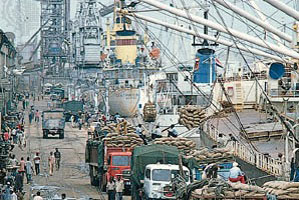The Technological Change Lab (TCLab) is a research and advisory program associated with the Urban Planning program at Columbia University. It is housed at the Graduate School of Architecture, Planning and Preservation (GSAPP) and brings together economic development and social policy concerns underlying technological changes in urban city-regions and countries today. TCLab works across multiple industrial sectors with ongoing and planned projects across several industrialising countries.
Our Focus:
An important focus for TCLab research is the relationship between urban and regional institutions and more traditional (and national) industrial, social and labor institutions. The research and philosophical engagement of TCLab is with the manner in which efficiency and equity are instituted and play out in practice. The research and advisory elements of the Lab aim to layout several practice, theory and philosophical dilemmas that affect national and city-regional economic goals and planning processes.
TCLab ("T-C Lab") aims to break down several disciplinary and programmatic boundaries in economic development and institutional change. A unique feature of TCLab work is the linking of innovation and welfare/equity issues and a focus on the practice (not just theory) of integrating frameworks that link economic and social goals. We have an ever-widening Advisory, Senior Research Affiliate, and student body. Increasingly, economic development expertise has dwindled in several traditional disciplines and has become split into two scholarly and policy analysis communities: one that has on-the-ground development planning and policy expertise, and those that model economic development in the abstract without this experience. TCLab research is situated to remedy this academic and advisory divide and provides a public forum for intellectual and policy debate around issues of development and industrial policy. |
Around 3 billion people live in urban areas and most of them work in rapidly transforming sectors. Work and employment prospects are intimately tied to technological changes such as new types of production systems, with diverse economic organisation and mechanization. In addition, several innovations in health technologies, information and communication technologies are redefining the ways in which industrial sectors perform, and the ways in which people use products and processes. While the productive aspects of economic development often dominate national and regional debates, there is an urgent need to give attention to labour and health issues in considering urban development. These may include planning and policy concerns such as availability and conditions of work, labour standards, the constrained right to use public spaces, or the impact of global trade on the location, pace of productivity changes and intensity of work. In addition, technological changes drive new forms of identity and collective action. The research and philosophical engagement of the Lab is with the nature of technological and industrial change, and the manner in which efficiency, equality and conceptions of equity are instituted and play out in practice. The Lab’s focus is on the social and employment relationships within which technological change is embedded -- from pharmaceuticals to construction to communication technologies -- and the nature of markets and corresponding regulation of the economy. |
The urban-rural relationship is far from neatly divided as much of economic theory would suggest. A sectoral lens can provide some insights into the nature of these ties, particularly through a better grasp of non-farm rural employment and changing agrarian and peri-urban socio-political relations. In addition, several innovations in processing technologies, health technologies and information and communication technologies are redefining the ways in which industrial sectors perform, and the ways in which people use and consume products and processes. While the productive aspects of economic development often dominate national and regional debates, there is an urgent need to give attention to labour and health issues in considering urban development. These may include planning and policy concerns susch as the varieties of market and non-market exchange, the regulation of a mixed economy, availability and conditions of employment, the nature and concentration of industrial investments, the increasing sub-national institutions for trade and technical production standards, the crowding out and constrained right to public spaces and industrial land regulation, or the impact of global trade on the location, pace of productivity changes and intensity of work. |

